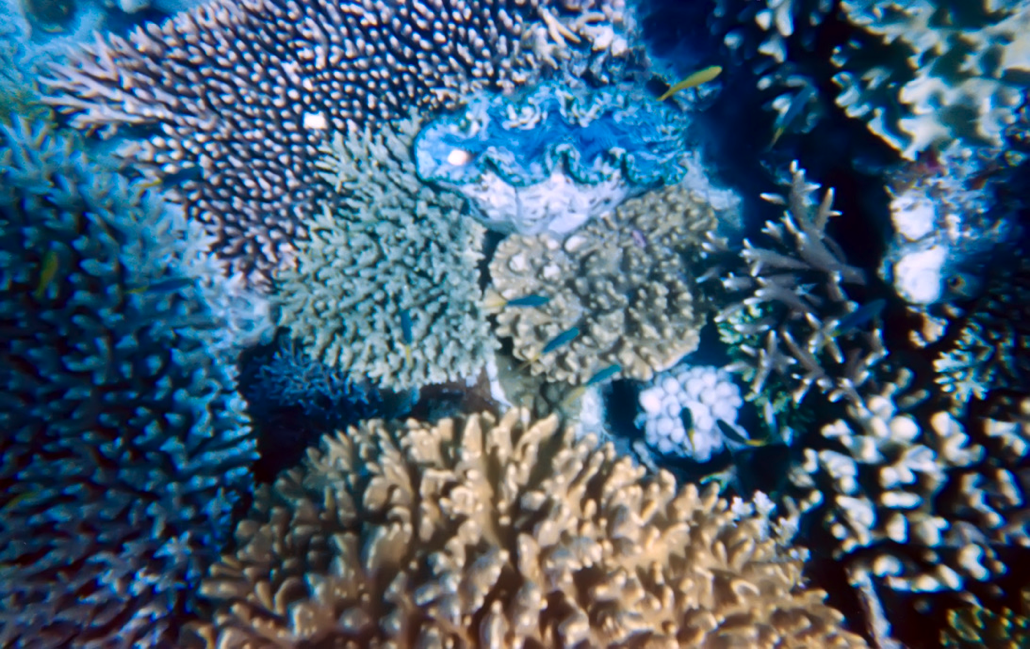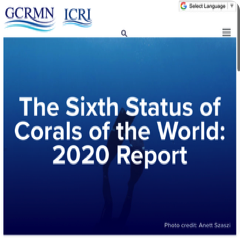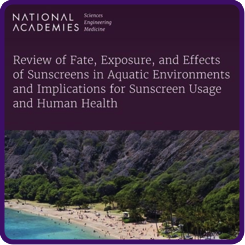
🔝
🔝

Information
Coral Bleaching @ The Nature Conservancy
Coral Reef Bleaching @ Marine Biology Learning Center
Coral Reef maps by country @ WWF
Institutions ~ Initiatives
Quintana Roo coral reef insurance policy
Institutions ~ Government
Australian Institute of Marine Science
US Coral Reef Task Force (USCRTF)
US National Oceanic and Atmospheric Administration (NOAA)
Atlantic Oceanographic and Meteorological Laboratory
National Coral Reef Monitoring Program (NCRMP)
Coral Reef Conservation Program
Florida Department of Environmental Protection
Coral Reef Conservation Program
Institutions ~ Research
ARC Centre of Excellence for Coral Reef Studies @ James Cook University
Institutions ~ Nongovernmental
Center for Biological Diversity
Coral Assisted Evolution Project
Coral Restoration Foundation [Florida]
International Coral Reef Initiative
International Coral Reef Action Network
Islamorada Conservation and Restoration Education (I.CARE) [Florida, USA]
National Marine Sanctuary Foundation
Shark and Coral Conservation Trust (Australia)
Institutions ~ Private sector
Great Barrier Reef
Challenges and Solutions for the Great Barrier Reef
Citizens of the Great Barrier Reef
GBR @ Google Maps
· learn more about how the GBR is suffering, and how to save it
· campaigns to save the reef
· an environmental charity dedicated to saving the reefs through hands-on projects
Select readings on coral reefs & climate change
· In reverse chronological order.
Coral reef conservation program: Strategic plan for 2021-2025
· 2021 ~ NOAA
· Outlines the strategic goals and priorities of the US Coral Reef Conservation Program through 2025
· Includes objectives related to improving coral reef management and conservation, enhancing
science and research, and increasing public awareness and engagement.
Ecosystem‐based management of coral reefs under climate
· 2018 ~ Bethany Harvey ~ Ecology and Evolution
· Current coral reef management strategies have various shortcomings in effective coral reef preservation.
· In particular, such strategies do not consider the combination of natural changes and human impacts that affect coral reef populations.
· Coral reef management strategies that take into account the complex social-ecological nature of coral
reef systems include minimizing local stressors, implementing Marine Protected Areas (MPAs), active
management approaches, and combining conservation strategies with spatial planning. All of these
should be used in future management procedures.
· Considering new management strategies and limiting warming to 1.5-2 degrees Celsius, this will
provide the best chance at maximizing coral reef resilience in the face of climate change.
· 2018 ~ United Nations Environment Programme ~ International Sustainability Unit, & International Coral Reef Initiative
· Discusses the economic value of coral reefs and their ecosystem services
· Provides case studies and recommendations for sustainable financing and investment in coral reef conservation and restoration efforts.
· 2017 ~ GBRMPA (The Great Barrier Reef Marine Park Authority)
· Corals rely on a symbiotic relationship with zooxanthellae to survive. While under stress, corals lose
their zooxanthellae, which causes corals to starve and appear colorless. This doesn’t always happen.
· The first mass coral bleaching event was in 1998, when the world lost 90% of its coral by area. The
Great Barrier Reef suffered heavy damage during the 1998 bleaching event, and suffered even more
damage during a 2016 bleaching event. Similarly significant bleaching events will likely continue due
to climate change.
· 2016 ~ Arielle Sarah Levine et al. ~ NOAA technical memorandum CRCP
· US agencies sponsoring this report included the National Ocean Service, National Oceanic and
Atmospheric Administration & Coral Reef Conservation Program
· Outlines a national program for monitoring the health of coral reef ecosystems in American Samoa
· Provides data and information on the status and trends of coral reefs in American Samoa
· Offers resources for managing and protecting coral reefs.
Coral reefs and people in a high-CO2 world: Where can science make a difference to people?
· 2016 ~ Linwood Pendleton et al. ~ PLOS ONE
· Outlines the impacts of ocean acidification and other climate change-related stressors on coral reefs and the people who depend on them
· Offers recommendations for reducing carbon emissions and protecting coral reef ecosystems
· Calls for interdisciplinary research and collaboration to address the complex challenges facing coral reefs.
· 2016 ~ Kenneth Anthony ~ Annual Review of Environment and Resources
· Ocean acidification slows reef growth, alters competitive interactions, and impairs population
replenishment. For managers and policymakers, ocean warming and acidification represent
challenges to increasing coral reef resilience as coral reefs become weaker under current warming
trends.
· Effective local, regional, and global coral reef management strategies will require setting realistic
goals that consider the declining resilience of coral reefs and the costs of managing a coral reef-protected area.
The coral reef crisis: The critical importance of <350 ppm CO2
· 2009 ~ Veron et al. ~ Marine Pollution Bulletin
· Even relatively small changes in atmospheric CO2 levels can have massive effects on coral reefs.
· Certain benchmarks are of note in coral reef conservation. At 450 ppm of CO2, coral reefs will be in a
terminal decline. At 600 ppm, reefs will likely physically erode and force habitants into refugia.
· 2008 ~ Andrew Baker et al. ~ Estuarine, Coastal, and Shelf Science
· Recovery trends among coral reefs in different parts of the world are different, with some areas of
coral reefs experiencing rapid recovery while others are experiencing a decline in their recovery rates
after a bleaching event.
· Whether affected reefs can continue to function will depend on factors such as how much coral cover
is lost, the ability of coral communities to acclimate to higher temperatures, and our ability to maintain
ecosystem resilience.
Coral Reefs Under Rapid Climate Change and Ocean Acidification
· 2007 ~ Hoegh-Guldberg et al. ~ Science
· Many contemporary corals do not appear to have the capacity to adapt to sudden environmental
change. Therefore, we will likely see an increase in the frequency and severity of coral bleaching,
disease, and mortality as global mean CO2 levels and temperatures increase.
· If atmospheric CO2 levels stabilized at 380 ppm, reef composition would likely not experience
dramatic change. If atmospheric CO2 levels increased to 450 to 500 ppm, reefs would likely become
dominated by more thermally-tolerant corals. If atmospheric CO2 levels increase above 500 ppm,
coral reef ecosystems would likely crumble.
A reef manager's guide to coral bleaching
· 2006 ~ P.A. Marshall et al. ~ Great Barrier Reef Marine Park Authority, Australia
· Provides information on the causes and impacts of coral bleaching, a major threat to coral reef ecosystems
· Offers guidance on monitoring and responding to coral bleaching events
· Provides strategies for managing and protecting coral reefs in the face of climate change.
· 2003 ~ Jordan West and Rodney Salm ~ Conservation Biology
· A strategy to study coral reefs' resistance and recovery trends is to identify key areas where coral
reefs experience low mortality even in warmer-than-average sea temperatures and key areas where
coral reefs can quickly recover after a bleaching event.
· Identifying these “target areas” will help managers of Marine Protected Areas decide on areas of
coral reefs that need increased protection. Increasing protection will help preserve traits that are vital
for coral reef resistance and recovery and protect them from environmental stresses caused by
anthropogenic activities. In addition, these “target areas” make it easier to monitor recovery performance.
Coral bleaching: the winners and the losers
· 2001 ~ Loya et al. ~ Ecology Letters
· Coral bleaching has more of an impact on finely branched corals, and has less of an impact on massive
and encrusting corals. The thicker the tissue of a coral is, the more likely it is to survive bleaching.
· Coral bleaching has different impacts on each species of coral. Many of these impacts can have drastic effects on ecosystems.
Climate change, coral bleaching and the future of the world's coral reefs
· 1999 ~ Ove Hoegh-Guldberg ~ Marine and Freshwater Research
· Severe coral bleaching events are likely to become more commonplace as sea temperatures rise.
· The loss of coral reefs (and the ecosystems they reside in) would be harmful for tourism, fishing,
building materials, coastal protection and bioprospecting.
Coral reef bleaching in the 1980s and possible connections with global warming
· 1991 ~ Peter Glynn ~ Ecology and Evolution
· The symbiotic relationship between dinoflagellate algae and coral reefs is integral to constructing
large wave-resistant coral reefs. Environmental stresses that affect his relationship have been
recorded since the 1980s and have been suggested as the cause of coral bleaching.
· If sea temperatures warm by 1-2 degrees Celsius over the next century, corals will decline in large
numbers with geographically isolated populations being the most susceptible to rapid sea
warming. Some populations may withstand higher-than-average sea temperatures but can
experience long-term effects on future growth rates.
Want to participate in saving the coral reef? An Australian based citizen science project allows people from all over the world help monitor coral bleaching. To get involved, check out CoralWatch.
Corals & coral reefs
Contents of this page:
~ Research
· Great Barrier Reef, Australia
· Select readings on coral reefs & climate change
Also see:
Minran Jiang & Declan Tsuyuki (2023) and Cooper Gottfried (2022) of Brandeis University contributed to this page.




